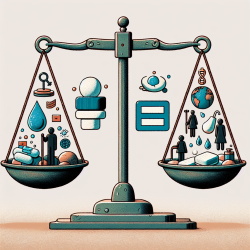Introduction
As practitioners dedicated to enhancing the lives of children with cerebral palsy, we are always on the lookout for evidence-based approaches that yield the best outcomes. A recent study titled Focus on Function – a randomized controlled trial comparing two rehabilitation interventions for young children with cerebral palsy offers valuable insights into two different therapeutic approaches: task/context-focused and child-focused remediation. This blog will explore how these findings can be applied in practice to improve therapeutic interventions for children with cerebral palsy.
Understanding the Research
The study conducted a multi-site randomized clinical trial to evaluate the efficacy of a task/context-focused approach versus a child-focused remediation approach. The goal was to improve the performance of functional tasks, increase participation in everyday activities, and enhance the quality of life for children aged 12 months to 5 years with cerebral palsy.
Key findings highlighted the importance of a task/context-focused approach, which emphasizes adapting the environment and tasks to meet the child's needs rather than solely focusing on changing the child's abilities. This approach aligns with the principles of Dynamic Systems Theory, suggesting that functional success can be achieved through a combination of internal and external factors.
Implementing Findings in Practice
For practitioners looking to apply these findings, consider the following strategies:
- Promote Functional Performance: Focus on achieving specific functional goals identified collaboratively with the family, child, and therapist. Success is measured by task completion rather than achieving "normal" movement patterns.
- Identify Periods of Change: Introduce interventions when the child is ready to learn a new task or change an existing one. This period of transition can be a window of opportunity for achieving new functional goals.
- Modify Constraints: Identify and modify constraints within the task or environment before focusing on the child's abilities. This might involve changing the size of an object or altering the environment to facilitate task completion.
- Encourage Practice: Provide opportunities for children to practice new skills in natural settings. Practice should be focused on achieving functional goals rather than perfecting movement patterns.
Encouraging Further Research
While this study provides a solid foundation, further research is needed to explore the long-term effects of these approaches and their applicability across different settings and populations. Practitioners are encouraged to contribute to this growing body of knowledge by documenting and sharing their experiences and outcomes.
Conclusion
By integrating these research findings into practice, therapists can create more effective, personalized interventions that enhance the quality of life for children with cerebral palsy. To delve deeper into the original research, please follow this link: Focus on Function – a randomized controlled trial comparing two rehabilitation interventions for young children with cerebral palsy.










